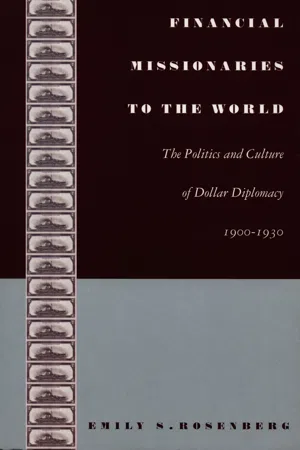
Financial Missionaries to the World
The Politics and Culture of Dollar Diplomacy, 1900–1930
- English
- PDF
- Available on iOS & Android
Financial Missionaries to the World
The Politics and Culture of Dollar Diplomacy, 1900–1930
About This Book
Winner of the Society for Historians of American Foreign Relations Robert H. Ferrell Book Prize
Financial Missionaries to the World establishes the broad scope and significance of "dollar diplomacy"—the use of international lending and advising—to early-twentieth-century U.S. foreign policy. Combining diplomatic, economic, and cultural history, the distinguished historian Emily S. Rosenberg shows how private bank loans were extended to leverage the acceptance of American financial advisers by foreign governments. In an analysis striking in its relevance to contemporary debates over international loans, she reveals how a practice initially justified as a progressive means to extend "civilization" by promoting economic stability and progress became embroiled in controversy. Vocal critics at home and abroad charged that American loans and financial oversight constituted a new imperialism that fostered exploitation of less powerful nations. By the mid-1920s, Rosenberg explains, even early supporters of dollar diplomacy worried that by facilitating excessive borrowing, the practice might induce the very instability and default that it supposedly worked against. "[A] major and superb contribution to the history of U.S. foreign relations.... [Emily S. Rosenberg] has opened up a whole new research field in international history."—Anders Stephanson, Journal of American History
"[A] landmark in the historiography of American foreign relations."—Melvyn P. Leffler, author of A Preponderence of Power: National Security, the Truman Administration, and the Cold War
"Fascinating."—Christopher Clark, Times Literary Supplement
Frequently asked questions
Information
Table of contents
- Contents
- Introduction
- 1 Gold-Standard Visions: International Currency Reformers, 1898–1905
- 2 The Roosevelt Corollary and the Dominican Model of 1905
- 3 The Changing Forms of Controlled Loans under Taft and Wilson
- 4 Private Money, Public Policy, 1921–1923
- 5 Opposition to Financial Imperialism, 1919–1926
- 6 Stabilization Programs and Financial Missions in New Guises, 1924–1928
- 7 Faith in Professionalism, Fascination with Primitivism
- 8 Dollar Diplomacy in Decline, 1927–1930
- Abbreviations
- Notes
- Index